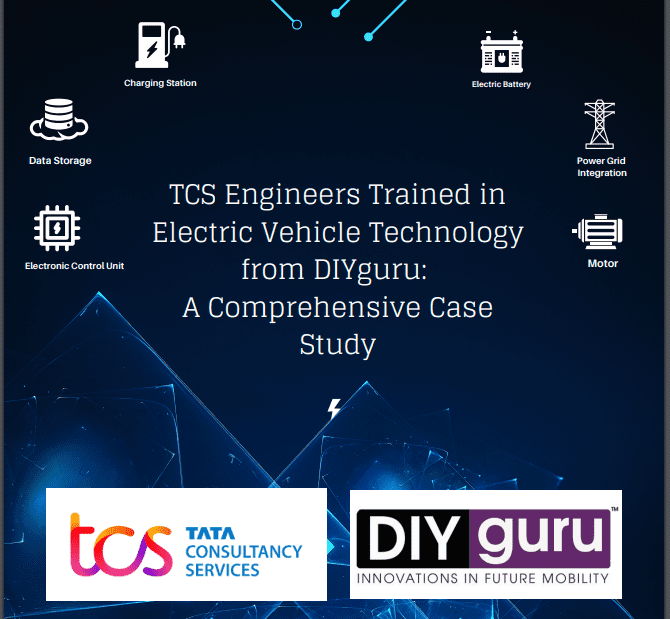
- Introduction:
- How Does the EV Training Program Help Companies Stay Competitive in the EV Industry?
- Which Technologies Did We Target in the EV Training Program?
- Conclusion:
Introduction:
The demand for skilled engineers in the electric vehicle (EV) industry is on the rise, and companies are making the transition toward sustainable mobility. To meet this demand, Tata Consultancy Services (TCS) partnered with DIYguru to provide a comprehensive EV training program for its engineers. TCS Electric Vehicle Training case study explores the EV training program provided by DIYguru, its target, technical details, curriculum, targeted technologies, benefits for TCS engineers, and the impact of the training on the EV industry.
- What Was the Target of the EV Training Program?
- The target of the EV training program was to provide a comprehensive understanding of the EV ecosystem, including the technical aspects of EV technology, and practical experience in designing, developing, and maintaining EVs. The program was designed to meet the growing demand for skilled engineers in the EV industry.
- How Does the EV Training Program Benefit the EV Industry?
- The EV training program offered by DIYguru and TCS provides significant benefits for the EV industry. By training skilled engineers in EV technology, companies can improve the efficiency of their operations, reduce emissions, and reduce their reliance on fossil fuels. The EV industry is rapidly growing, and companies that adopt EV technology are better positioned to meet the growing demand for sustainable mobility.
- What Was the Target of the EV Training Program?

Introduction:
The EV industry is highly competitive, and companies that invest in research and development of EV technology, collaborate with EV companies, and train their employees in EV technology are better positioned to stay competitive in the market. By offering a comprehensive EV training program, DIYguru and TCS are helping companies stay competitive in the EV industry and meet the growing demand for skilled engineers.
- What Were the Technical Details of the EV Training Program?
- The EV training program was an eight-week program that included approximately 50 hours of training, with around 7-8 hours of training per week. The program included a mix of online and live sessions, assignments, and projects to give participants a hands-on experience of EV technology.
- The program covered various domains, including EV topologies, motors, battery and battery management systems, charging infrastructure, and EV powertrain. The program also included several projects, such as designing an EV powertrain, developing a battery thermal model, and simulating a solar PV-based charger.
- What Were the Technical Details of the EV Training Program?
Which Technologies Did We Target in the EV Training Program?
The EV training program targeted various technologies, such as:
- Different types of EV topologies, including battery electric vehicles (BEV), range-extended electric vehicles (REV), series, parallel, and series-parallel hybrid electric vehicles (HEV).
- Different types of motors used in EVs, such as DC motors, brushless DC (BLDC) motors, permanent magnet synchronous motors (PMSM), and induction motors.
- Principles of battery management systems (BMS), including cell balancing, monitoring, and protection.
- Different types of batteries used in EVs, including lithium-ion batteries, and their electrical design.
- Different types of charging infrastructure for EVs, including level 1, level 2, and DC fast charging.
- Design principles and components of an EV powertrain, such as the motor, inverter, transmission, and differential.
- What is the Future of EV Technology, and How Will It Impact the Automotive Industry?
- The future of EV technology is promising, and the automotive industry is making a significant transition towards sustainable mobility. EVs offer several advantages, such as reduced emissions, lower fuel costs, and improved performance. As battery technology continues to improve, the range and charging time of EVs are also improving. The growth of the EV industry is expected to create more job opportunities and lead to a more sustainable future.
- What Were the Benefits of the EV Training Program for TCS Engineers?
- The EV training program provided several benefits for TCS engineers, such as:
- A comprehensive understanding of the EV ecosystem, including different EV topologies, motors, batteries, charging infrastructure, and EV powertrain.
- Practical experience in designing, developing, and maintaining EVs through projects.
- Improved technical skills in EV technology, which makes them more competitive in the job market.
- Improved productivity and efficiency in the workplace, as they can apply their knowledge in real-life scenarios.
- The EV training program provided several benefits for TCS engineers, such as:
Conclusion:
The EV training program provided by DIYguru and TCS is a comprehensive program that covers all the essential domains of EV technology. The program provides participants with a hands-on experience of EV technology and prepares them to meet the growing demand for skilled engineers in the EV industry. The program also benefits the EV industry by improving the efficiency of operations, reducing emissions, and creating a more sustainable future.
To Download the complete curriculum offered to TCS for this wonderful training program, Get in touch with us or fill the form below





